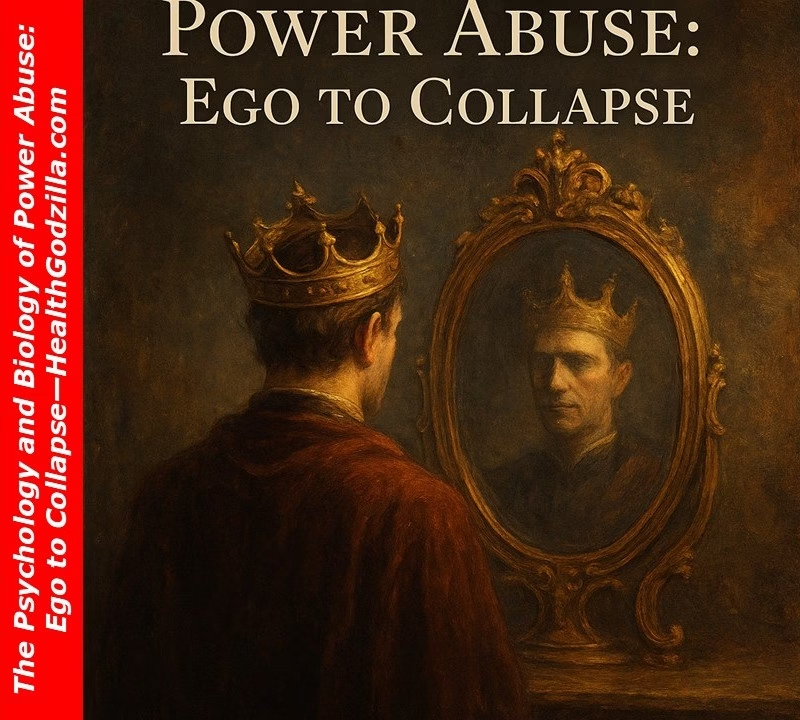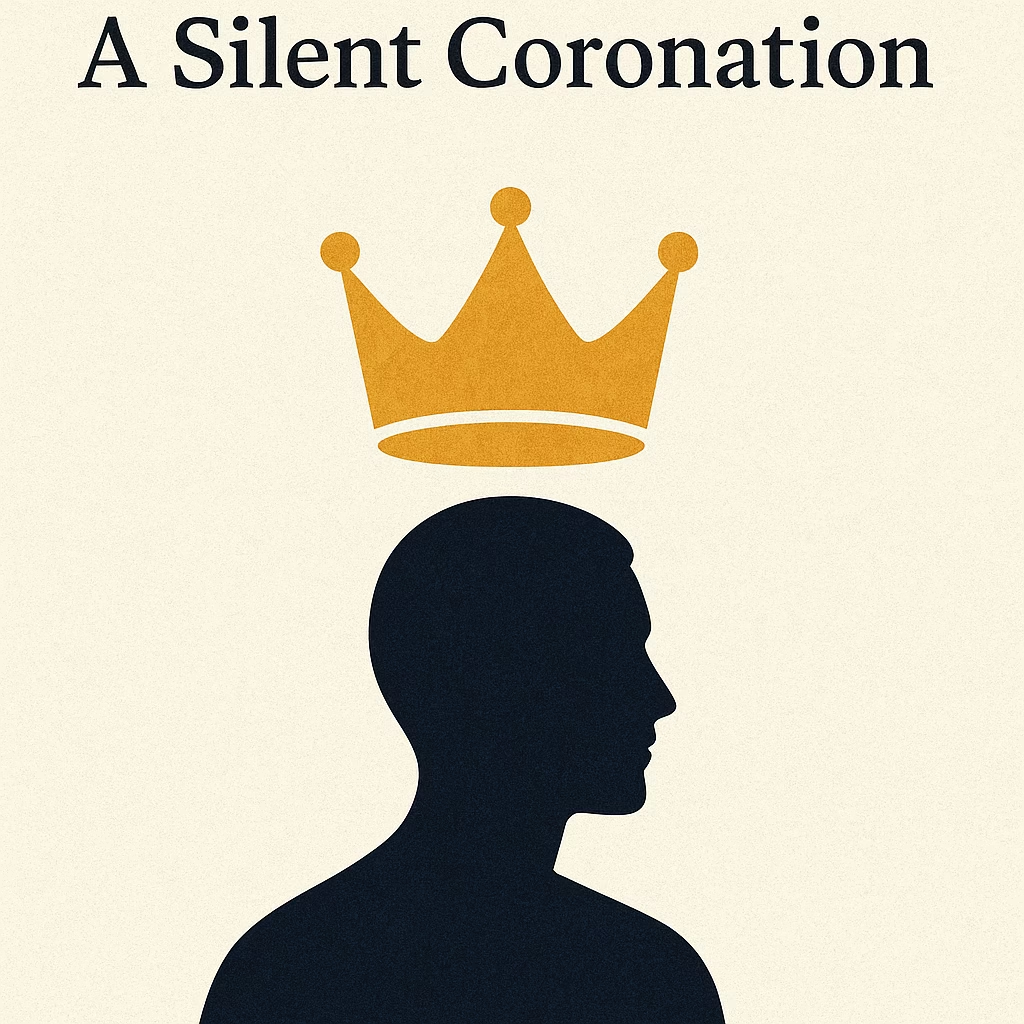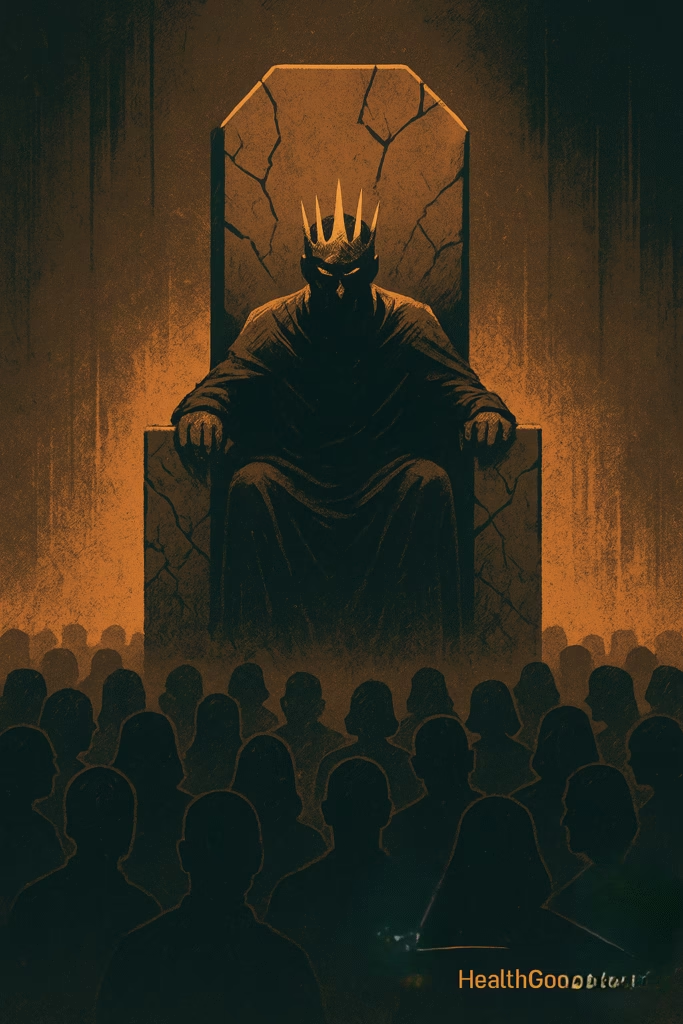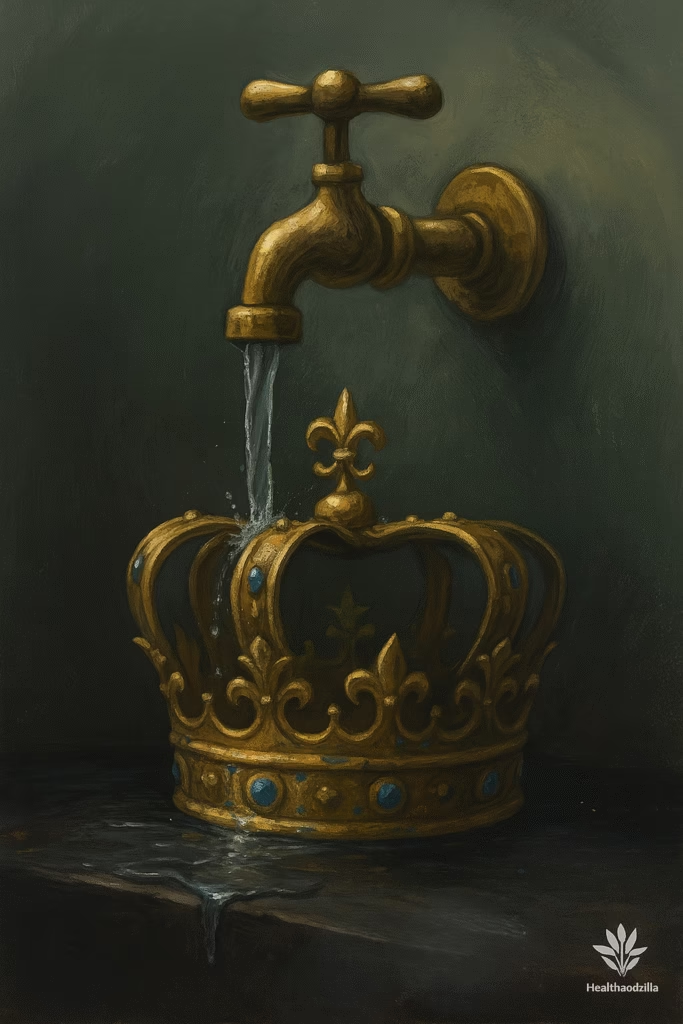
Prologue: The Mirror Throne
The psychology and biology of power abuse do not always announce themselves with tyranny or scandal. Instead, they sometimes sit quietly—on a throne not carved from oak or stone, but from glass. A mirror throne, polished so clean it vanishes into the air, save for the reflection it holds: the self, magnified.
Each morning, the leader approached—crowned not by coronation, but by acclaim, acquisition, and applause. Thus, the reflection smiled back: brilliant, untouchable, destined. And yet, something ancient stirred behind the gleam. The same echo haunted Narcissus beside his pool, Midas with his golden hunger, Macbeth with his prophecy—you are not the king, only the image of one.
What is power, if not the alchemy of image and influence? More importantly, what becomes of those who rule only by what they wish to see?
We do not begin with corruption; rather, we start with admiration. It begins with talent. Then comes charm. Finally, a story told so well it bends reality. In such stories, there are always advisors, voters, shareholders, or citizens who hand over power like an offering—believing the one on the throne will see the world more clearly than they can.
However, when the throne becomes a mirror, the king no longer sees the kingdom. Instead, he sees only himself—larger, purer, more eternal than truth can allow.
This article is a descent—not into villainy, but into mindset. It delves into neurochemistry, organizational psychology, and the quiet erosion of self-awareness. Specifically, it explores how power fused with a fixed mindset creates not monsters, but monarchs too blind to see the ruin at their feet.
And yet, this is not a story of doom. On the contrary, it is a mirror itself—held not to the powerful, but to us. What do we reward? Whom do we follow when vision is mistaken for virtue? And when the crown is unseen but felt—what do we quietly become?
Ultimately, the mirror throne is not only for kings. Sometimes, it waits for anyone who forgets the world beneath their name.
2. The Fixed Mindset: A Silent Coronation
Not all thrones arrive with trumpets. Some appear quietly, built not from gold or conquest—but from belief. A silent coronation begins the moment a leader starts being praised not for learning, but for being right.
In Carol Dweck’s mirror of the mind, this is the fixed mindset: a hunger to be seen as brilliant, rather than to become better. Growth is abandoned not in crisis, but in comfort. You begin to hear: “You’re a natural,” “You were born to lead,” “You always get it right.” And so, the story shifts—not of becoming, but of being. The crown rests not on progress, but on persona.
Lee Iacocca once turned Chrysler from near-collapse to profit with such precision that he became an icon—the man who saved Detroit. Yet in time, even he admitted, “I began to believe my own press.” The image outgrew the man. The desire to remain admired eclipsed the willingness to evolve. Dweck names this trap precisely: when leaders see challenge as threat and criticism as attack, they choose applause over adaptation.
In the psychology and biology of power abuse, the fixed mindset becomes a crown that binds as much as it elevates. Because if brilliance is seen as innate, any doubt becomes betrayal—not of strategy, but of self. The result? Leadership built on preservation, not transformation.
In Enron’s rise, Jeffrey Skilling championed a culture that rewarded intellect and risk—but punished humility. The smartest guys in the room did not ask questions; they answered them with certainty. Fixed mindsets, when crowned, do not seek truth. They seek to preserve an identity already believed to be unshakable.
Even as Sunbeam’s CEO, Al “Chainsaw” Dunlap wore efficiency like armor, Dweck’s lens reveals a deeper wound: a man obsessed with being seen as ruthless, decisive, infallible. Not open to growth, but desperate to maintain image.
And in the psychology and biology of power abuse, this image becomes addictive. Because to question yourself, in the world of the fixed mindset, is to risk the throne itself.
And so, the coronation happens not with a sword, but with a whisper:
“You are special. Stay that way.”
Not, “Keep growing.” Not, “Keep learning.”
This is the first illusion of power abuse: that you are already complete.

3. Power’s Spell: Biology of a Throne
Power does not always arrive with intent. Sometimes, it arrives with a shift in the bloodstream.
In the psychology and biology of power abuse, what begins as opportunity becomes chemical. Power rewards—and the brain learns. Every nod of deference, every decision obeyed without question, every room that hushes at your presence—feeds the circuitry. Dopamine flares. Testosterone rises. The amygdala, once tuned for empathy, grows quiet. What remains is not just ego—it’s anatomy.
Tobore’s dissection of power is not metaphor, but scan and signal. He describes how mesolimbic reward systems, designed to detect pleasure and reinforce survival behavior, become overactivated. Power acts like a drug—not metaphorically, but neurologically. In studies using fMRI, leaders under its spell show reduced activity in regions linked to mirror neurons—those subtle tools of empathy that allow us to feel the pain or joy of others.
So when we say, “Power corrupts,” we often miss the mechanism. It doesn’t merely twist morals—it rewires perception.
Consider how testosterone, elevated through sustained power, alters attentional bias. The leader no longer just sees the team—they scan for threat, for weakness, for challenge. Status becomes oxygen, dominance becomes safety. And once the brain adapts, it craves the fix.
In this light, the downfall of many iconic leaders—Skilling, Dunlap, even Lay—begins not in arrogance, but in biology. Their rise nurtured a feedback loop: confidence brought power, power brought neurochemical reward, reward bred invulnerability. Eventually, warning signs sounded like whispers. Doubt was dismissed as disloyalty. Empathy—too expensive.
And so, the throne is no longer symbolic. It is neural. Power doesn’t sit beside the leader. It lives within.
In the psychology and biology of power abuse, it’s not just the absence of critique that corrupts—but the altered ability to receive it. Over time, these biological shifts become structural—inside the brain, inside the organization, inside the culture. The leader becomes not only powerful, but different.
And the tragedy is this: they can’t always see the change. But the people around them do.
Tobore captures this silent drift:
“Power alters perception and behavior in such a way that the individual gradually loses sight of their initial values, becoming a stranger to their former self.”
It is not a coup of character, but an erosion. Like a castle slowly sliding into the sea—stone by stone—while its crown still glistens in the sun.
Imagine a mirror so slowly fogged that no one notices until the reflection is no longer a face, but a silhouette. Power does not shout its transformations. It hums them—at the synapse, in the silence, behind the smile.
4. When Leaders Stop Listening
In the beginning, power listens. It surveys. It learns. That’s how it earns its throne.
But over time, and especially under the spell of a fixed mindset, something shifts. The psychology and biology of power abuse reveals that power does not just change how leaders act—it changes what they can hear.
Self-righteousness becomes armor. Praise becomes proof. And dissent? It sounds less like feedback and more like betrayal.
Tobore names this well: the leader, under the influence of power, begins to “believe their own mythology.” They are not lying. They are echoing what the world has mirrored back for years. The illusion becomes shared—crafted by boardrooms, reinforced by applause, padded by silence. This is not narcissism in the classic sense. It’s structural self-sealing.
In such systems, critique is filtered. Doubt is rerouted. Honest voices are rebranded as “negative,” “not aligned,” or “unfit for the culture.” The organization begins to protect the illusion instead of the truth.
Carol Dweck describes hostile CEOs who lash out not because they are insecure—but because they have tethered their identity to being the smartest in the room. Any contradiction is not an idea to explore, but a threat to extinguish. The Psychology and Biology of Power Abuse helps us see how this behavior is not merely emotional—it’s cognitive, even chemical. The mind resists correction when the self is built atop infallibility.
This is how leadership becomes lonely—not in solitude, but in sound.
Over time, these leaders stop asking questions. Or worse, they ask—but don’t wait for answers.
Tobore calls it “the illusion of moral authority.” The belief that because one holds power, one is right. And if you are always right, what’s the need to listen?
Organizations under such leaders exhibit a quiet paralysis. No one wants to be the one who tells the emperor there’s spinach on his teeth. Or worse—that the emperor is losing the ability to chew truth at all.
The case of Jeffrey Skilling at Enron haunts this silence. Known for intellectual bravado, Skilling dismissed dissent and basked in adoration. His confidence became institutional doctrine. According to former insiders, “questions were frowned upon, and doubts were whispered, not spoken.” By the time the façade cracked, listening had long died—and with it, Enron’s integrity.
So too in myth. King Leontes in The Winter’s Tale suspects his wife of betrayal. Despite loyal voices pleading reason, he listens only to his poisoned pride. The result? Tragedy, exile, and the near-death of all he loved.
In both boardroom and fable, when leaders stop listening, the kingdom fractures—not with thunder, but with a sigh.

5. Empires Built on Fear
If the mirror throne is polished by praise, it is guarded by fear.
Here, truth walks barefoot, and flattery wears gold. Power fused with the fixed mindset does not merely stop listening—it begins reshaping what is said, even what is seen. It builds its empire not on trust, but on trembling.
In such cultures, people don’t lie because they are dishonest. They lie because they are afraid.
Tobore calls it the “dehumanization of subordinates.” Once leaders begin to view others not as minds, but as extensions of their authority, reality itself becomes a curated performance. Dissenters vanish. Conformists rise. A chilling quote echoes from Jim Collins:
“The moment you feel the need to tightly manage someone, you’ve already made a hiring mistake.”
But what if the mistake was not in hiring—but in leading?
The organization begins to mirror the mind of the monarch: wary, curated, and echoing its own applause. Praise becomes policy. Critique becomes disloyalty. And eventually, loyalty becomes blindness.
We’ve seen it in the trembling halls of Sunbeam Corporation under Al Dunlap. Nicknamed “Chainsaw Al,” Dunlap created an atmosphere so fear-soaked that silence became survival. According to internal accounts, employees “avoided eye contact, held back suggestions, and laughed at jokes that weren’t funny.” Creativity suffocated. Courage was exiled. Performance became performance in the theatrical sense.
This is not fiction. It is biology. Tobore explains how power alters the brain’s empathy circuits. The result is judgment bias, gossip as strategy, and a reward system that punishes honesty. Even perception itself gets filtered—what the powerful see is not the truth, but what they have been conditioned to expect.
Gandhi once warned, “The day the power of love overrules the love of power, the world will know peace.” But within these mirrored empires, love is irrelevant. What matters is control.
The irony? These leaders often claim they value transparency. But it’s a one-way mirror—they see others; others cannot see them.
Over time, sycophancy becomes survival. Like courtiers praising the emperor’s invisible robes, everyone claps louder—not because they believe, but because silence is more dangerous than agreement.
Fear does not just warp communication. It warps cognition. Employees forget how to think critically. Feedback loops collapse. The entire structure becomes a cathedral of echo.
And when the cracks appear—when sales plummet, when lawsuits loom, when the public peeks behind the curtain—the fall is not just rapid. It is disorienting. Because no one inside saw it coming. Or rather, they saw—but learned not to speak.
This is not just a cautionary tale. It is a cycle. And it ends only when the emperor learns to disrobe not just his ego—but the fear that shields it.
6. The Cracks in the Crown
The fall does not always arrive with drums and disaster.
Sometimes, it begins with a missed email.
An ignored voice.
A meeting where the room is silent—not out of agreement, but out of habit.
Power fused with a fixed mindset carries within it a slow erosion—what Tobore calls a “self-perpetuating cycle of distortion.” Leaders start making decisions based on filtered truths, surrounded by advisors too fearful to correct them. Risk appears manageable—until it isn’t. Accountability seems intact—until the first thread is pulled.
Take Kenneth Lay and Jeffrey Skilling of Enron. Their empire dazzled the world with innovation, speed, and the illusion of control. But the company’s culture, steeped in overconfidence and image management, rejected feedback as weakness. Even as financial structures began to collapse from within, leaders doubled down on myth rather than reality.
And Dunlap? Chainsaw Al cut too deep, too quickly. Wall Street celebrated the numbers—until the blade turned inward, and Sunbeam’s own financial skeleton began to surface. A few quarters of glory bought at the cost of a corporate soul.
Tobore illustrates it in a striking sequence:
Power → Heightened confidence → Decreased feedback → Poor decisions → Collapse.
It’s a crown that gets heavier as it becomes hollow.
These leaders do not necessarily fall because of a single colossal error. They fall because the error becomes invisible until it’s irreversible. The fixed mindset abhors feedback—it interprets critique as attack, mistakes as shame, and learning as weakness. So the system learns to stop learning.
Sometimes, collapse is quiet—a loss of market relevance, a dwindling of public trust, a leadership exit dressed as “retirement.”
Other times, it’s loud—an exposé, a stock crash, a courtroom.
But beneath both is the same crack: the refusal to grow.
Not because growth was impossible—but because truth became unbearable.
What remains is legacy, and legacy has two paths:
One where others say, “They learned.”
Another where they whisper, “They never listened.”
And what a cost that difference carries—not just in revenue or reputation, but in memory. The empire becomes a lesson. The crown, an artifact. The mirror, a relic that no longer reflects.

7. Can We Hold the Crown with Clean Hands?
So what happens when we see the mirror?
What do we do when the reflection no longer flatters—but reveals?
The psychology and biology of power abuse reveal one unsettling truth: systems built to elevate are rarely built to correct. Tobore calls it “the structural limits of accountability”—a world where oversight is often symbolic, where ethics become PR, and where learning becomes optional once status is secured.
In a perfect system, the crown would be held with clean hands—monitored by checks, balanced by structures, and polished by humility. But in reality, accountability often functions like a fire alarm: noticed only when the building starts burning.
Whistleblowers are sidelined.
Critical voices are labeled disloyal.
Leaders become legends in their own echo chambers.
Even in democratic institutions or regulated corporations, the same question rings: who watches the one with the vision?
And more urgently—who dares to speak when vision turns into vanity?
Carol Dweck offered a path forward long before these crowns cracked. The growth mindset—humility in action—invites leaders to be learners. Not infallible icons, but humans still in process. A leader with a growth mindset sees criticism as a compass, not a curse. They measure power not by obedience, but by the courage their presence inspires in others.
Tobore reminds us:
“It is not power itself that corrupts, but the failure to question power’s changes within us.”
To hold the crown with clean hands is to know that dirt will find you anyway. The test is whether you wash it off or paint it gold.
That means building systems that breathe. Cultures where leaders listen downward as often as they speak upward. Workplaces where dissent is not punished but understood as loyalty in disguise. Teams where feedback isn’t a threat, but the heartbeat of evolution.
Not all victims seek power—but all power deserves checks.
Ultimately, to lead is to resist the throne becoming a mirror. To let the reflection show not just yourself—but the faces of those who trust you. To grow—not because you are weak—but because you are awake.
Because even the cleanest hands, left unchecked, forget how to feel.

🍂 Hello, Artista: The Echo Chamber and the Open Field
The dusk had not yet settled, but the wind already carried stories.
Artista sat cross-legged on a knoll, overlooking the wide open field. Not a throne in sight. Just soil, seeds, and silhouettes in motion. Organum arrived, his notebook half-filled, the other half waiting.
Artista:
Do you think we all wear crowns, in some hidden way?
Organum:
I think some wear them to protect, others to pretend. But the real question is—do we know when they start reflecting only us?
Artista (half-smiling):
Like speaking into a canyon and hearing only our name come back.
They paused, listening. A crow passed overhead, casting a brief shadow.
Organum:
Tobore spoke of brain chemistry. Dweck of mindsets. But still—I wonder—how do we feel when power begins to reshape us? Do we notice the mirror warping?
Artista:
Not always. The echo is warm. It flatters. It says, “You’re wise.” Even when we stop learning.
It’s not a crown we fear, really. It’s becoming too used to it.
Organum:
That’s the echo chamber, isn’t it?
A leader begins by listening to many. Then, only to those who clap.
Artista:
And soon, even silence begins to sound like applause.
They watched a group of children running downhill, their laughter a kind of freedom no crown could manufacture.
Organum:
Maybe the antidote isn’t humility as a virtue—but as a practice.
Artista:
To sit down.
To be wrong.
To hear something uncomfortable and not flinch.
Organum:
To clean the dirt off the crown—not with polish, but with pause.
The field lay wide, honest, unshaped by ego. There were no walls. No mirrors. Only the open wind and a question:
Artista:
Is leadership still a path… or has it become just a pedestal?
They did not answer.
Some truths grow only in the space where answers are not forced—but allowed.
✍️ Author’s Reflections
I was not alone when I wrote this. Others spoke, and I listened.
Their voices—some trapped in footnotes, some shouting from collapsed empires, some whispering across coffee tables—echoed through these pages. From Dweck’s quiet warnings about ego to Tobore’s scalpel-like dissections of power’s biological toll, I did not invent these truths. I only followed them where they led.
In writing The Psychology and Biology of Power Abuse, I found myself returning again and again to one feeling: unease. Not the unease of judgment, but the unease of recognition. I have seen the mirror throne—not in palaces, but in meeting rooms, on social media, even in my own temptations to be applauded more than understood.
This wasn’t just an article about “them”—those at the top.
It became a story about us. About me. About how easy it is to stop listening once we’re praised, how subtle the shift is when growth gives way to performance.
I remembered Krishnamurti’s truth:
“Authority is not the truth. Truth is the authority.”
And so I kept asking: can we lead without losing our faces in the reflection?
Writing this, I did not arrive at answers. But I arrived at a reverence for the question. That alone, perhaps, is a kind of guardrail on the path—so leadership remains a journey, not just a display.
“That is the heart of The Psychology and Biology of Power Abuse: not the villainy of others, but the vulnerability of all.”
To those who read this not just with their minds but with the soft, listening part of the heart—I thank you. You are the reason this mirror didn’t break, but instead turned into a window.
—Jamee
“The crown that listens is heavier… but it doesn’t shatter.”
“Every throne is borrowed. Only the soil remembers who sat.”
—Noorael
🌼 Articles You May Like
From metal minds to stardust thoughts—more journeys await:
- AOL-Time Warner failure: Merger, mindsets, and market myths. Explore culture clash, transient advantage, primacy, and antitrust risks.
- Biodiversity and nutrition: Reforming diets through agrobiodiversity. Policy, Traditional and Indigenous Foods, and Scientific Relevance.
Curated with stardust by Organum & Artista under a sky full of questions.
📚 Principal Sources
- Dweck, C. S. (2006). Mindset: The new psychology of success. Random House.
- Tobore, T. O. (2023). On power and its corrupting effects: The effects of power on human behavior and the limits of accountability systems. Communicative & Integrative Biology, 16(1), 2246793. Taylor & Francis.
Also available via: U.S. National Library of Medicine – NCBI https://pmc.ncbi.nlm.nih.gov/articles/PMC10461512/ - Bodie, M. T. (2006). AOL Time Warner and the false god of shareholder primacy. Saint Louis University School of Law Faculty Scholarship.
- Markkula Center for Applied Ethics. (2002, March 5). What really went wrong with Enron? A culture of evil? Santa Clara University.
- Agostini, M., & Favero, G. (2017). Accounting fraud, business failure and creative auditing: A micro-analysis of the strange case of Sunbeam Corporation. Accounting History, November 2017.
- Knowledge@Wharton. (2019, July 9). From Mustang to Minivan: How Lee Iacocca changed the auto industry. Podcast and transcript, Wharton School, University of Pennsylvania.
Leave a Reply